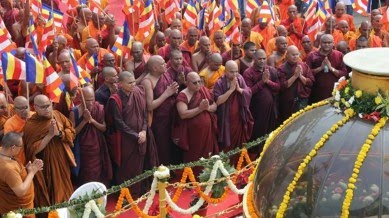Ahmedabad, April 12: In a recent development, the Gujarat government has issued a significant circular delineating the process for religious conversions within the state. The circular, issued by the Home Department on April 8, emphasizes that Buddhism must be recognized as a distinct religion separate from Hinduism, and consequently, any conversions from Hinduism to Buddhism (as well as Jainism and Sikhism) require prior approval from the district magistrate under the Gujarat Freedom of Religion Act, 2003.
The issuance of this circular follows concerns raised by the government regarding the interpretation and implementation of conversion procedures. The circular highlights instances where district magistrates were incorrectly interpreting the legal provisions under the Gujarat Freedom of Religion Act, potentially leading to misapplications and legal uncertainties.
Notably, the circular underscores that under the constitutional framework, Buddhism is to be treated distinctly from Hinduism, debunking interpretations that these faiths fall under the same umbrella. It emphasizes that applications for conversion from Hinduism to Buddhism, and other specified religions, must be processed in accordance with the prescribed rules and regulations.
The directive specifies that individuals seeking conversion must apply for prior permission from the district magistrate through a defined format. The district magistrates are instructed to meticulously evaluate each application based on legal provisions and state guidelines.
Ramesh Banker, Secretary of the Gujarat Buddhist Academy (GBA), welcomed the circular, highlighting the clarity it provides in recognizing Buddhism as a distinct religion deserving of separate legal considerations. Banker emphasized that conversions organized by the GBA consistently adhere to prescribed procedures, including seeking prior permissions in accordance with the law.
The prescribed application form for conversion entails detailed information about the individual(s) seeking conversion, such as personal particulars, socio-economic details, reasons for conversion, and specifics about the conversion event.
This development is significant against the backdrop of the prevailing trend of mass conversions to Buddhism, primarily among Dalits in Gujarat. The GBA, a prominent organization in the state, has been at the forefront of organizing such conversion events, advocating for the distinct recognition of Buddhism apart from Hinduism.
The Gujarat Freedom of Religion Act, which regulates religious conversions in the state, was enacted to curb conversions through coercion or misrepresentation. Recent amendments to the Act have included provisions specifically addressing conversions through marriage, placing the burden of proof on the accused and assigning investigations to senior police officials.
While this circular seeks to streamline conversion procedures, legal challenges surrounding the Act, particularly the amended provisions, remain under scrutiny in the Gujarat High Court. The government’s clarifications through this circular aim to ensure transparency and adherence to legal protocols in matters of religious conversions within the state.
In addition to the developments surrounding religious conversions in Gujarat, the circular issued by the state government has elicited varied responses, including perspectives from the Muslim community.
Some members of the Muslim community have expressed concerns over the implications of the Gujarat Freedom of Religion Act and its potential impact on interfaith relations. They emphasize the importance of upholding religious freedom and tolerance while cautioning against measures that could restrict individual choices regarding faith.
Representatives from Muslim organizations stress the need for a balanced approach that respects the autonomy of individuals to embrace different religions without undue interference or bureaucratic hurdles. They underscore the broader significance of fostering mutual respect and understanding among diverse religious communities in Gujarat.
The discourse surrounding religious conversions in the state reflects broader societal debates about secularism, pluralism, and the protection of religious freedoms. As legal frameworks continue to evolve, stakeholders from various religious backgrounds advocate for inclusive policies that uphold fundamental rights and promote harmonious coexistence among all communities.




